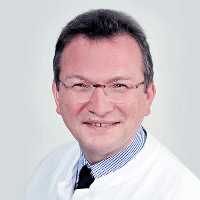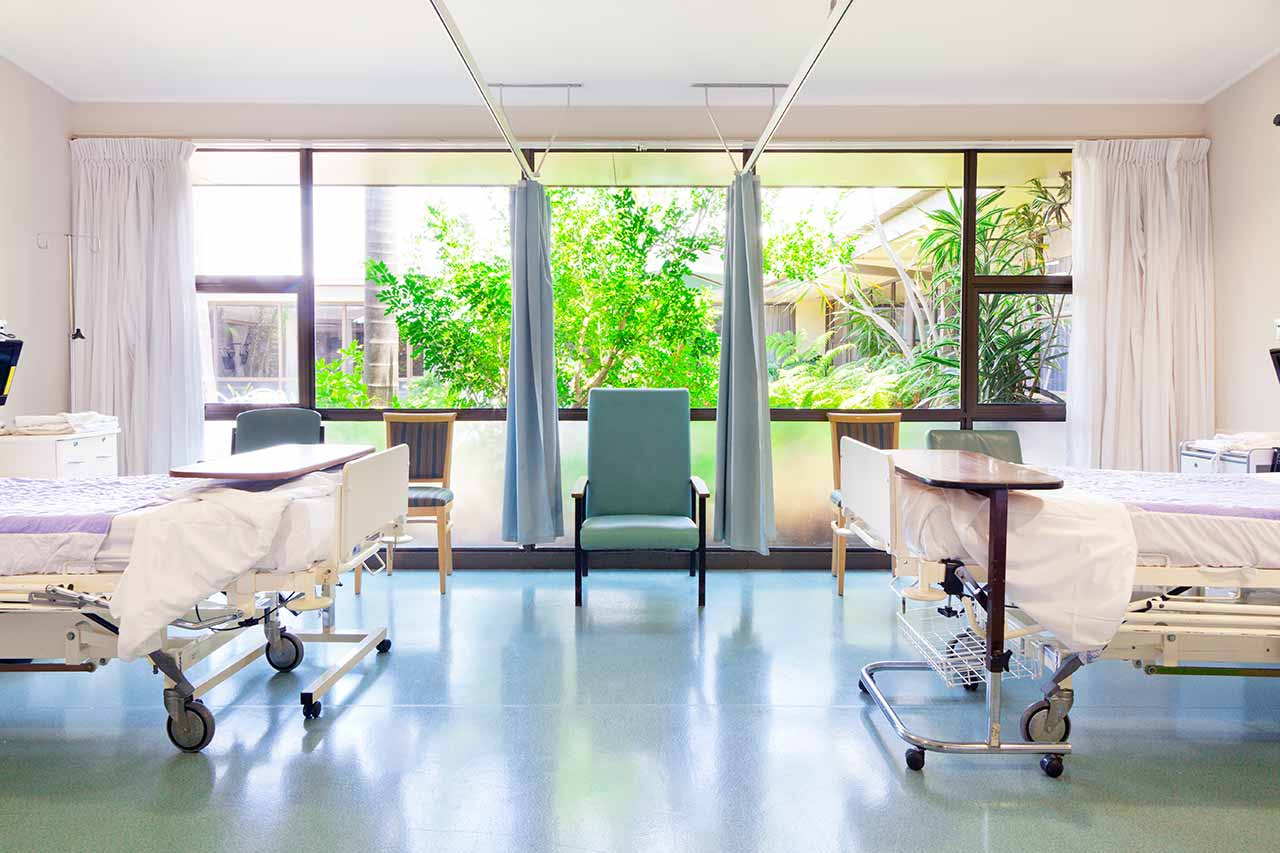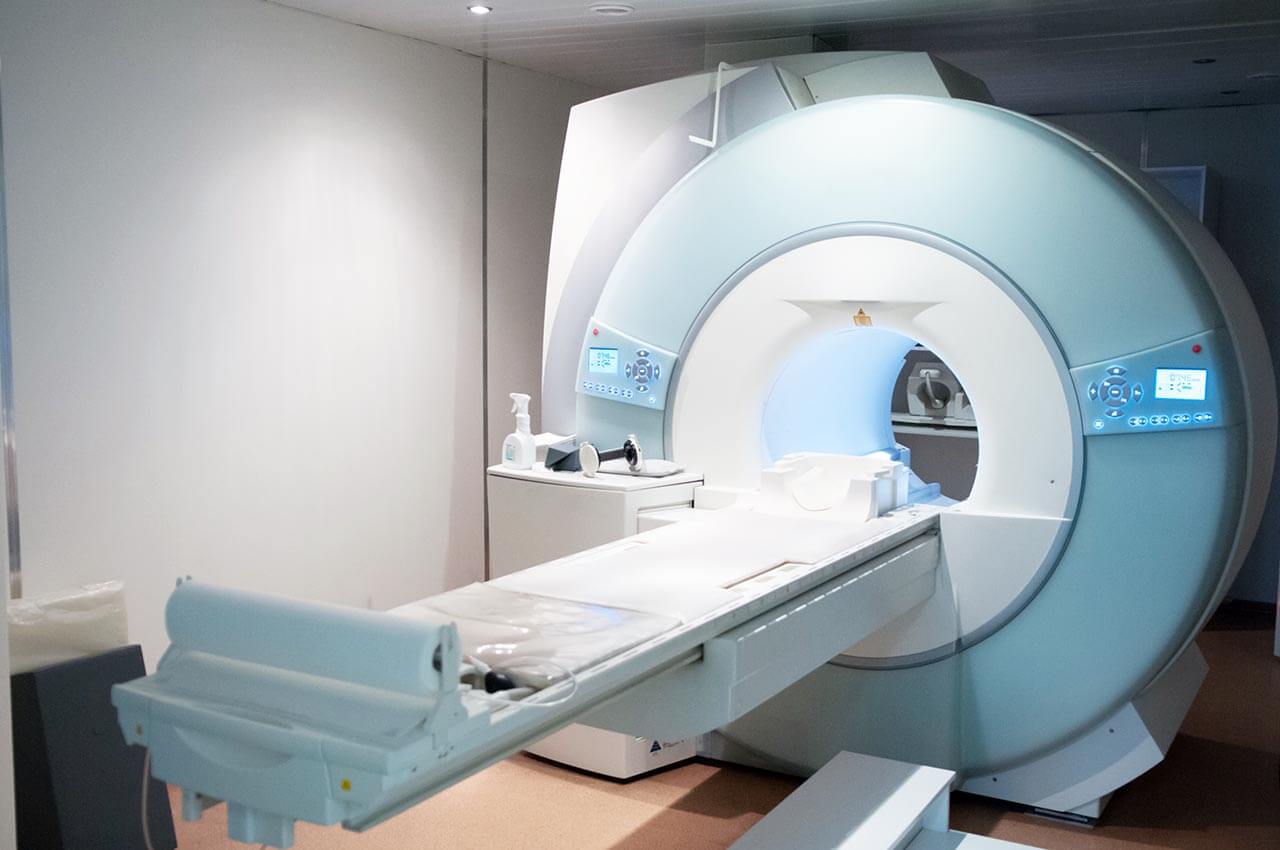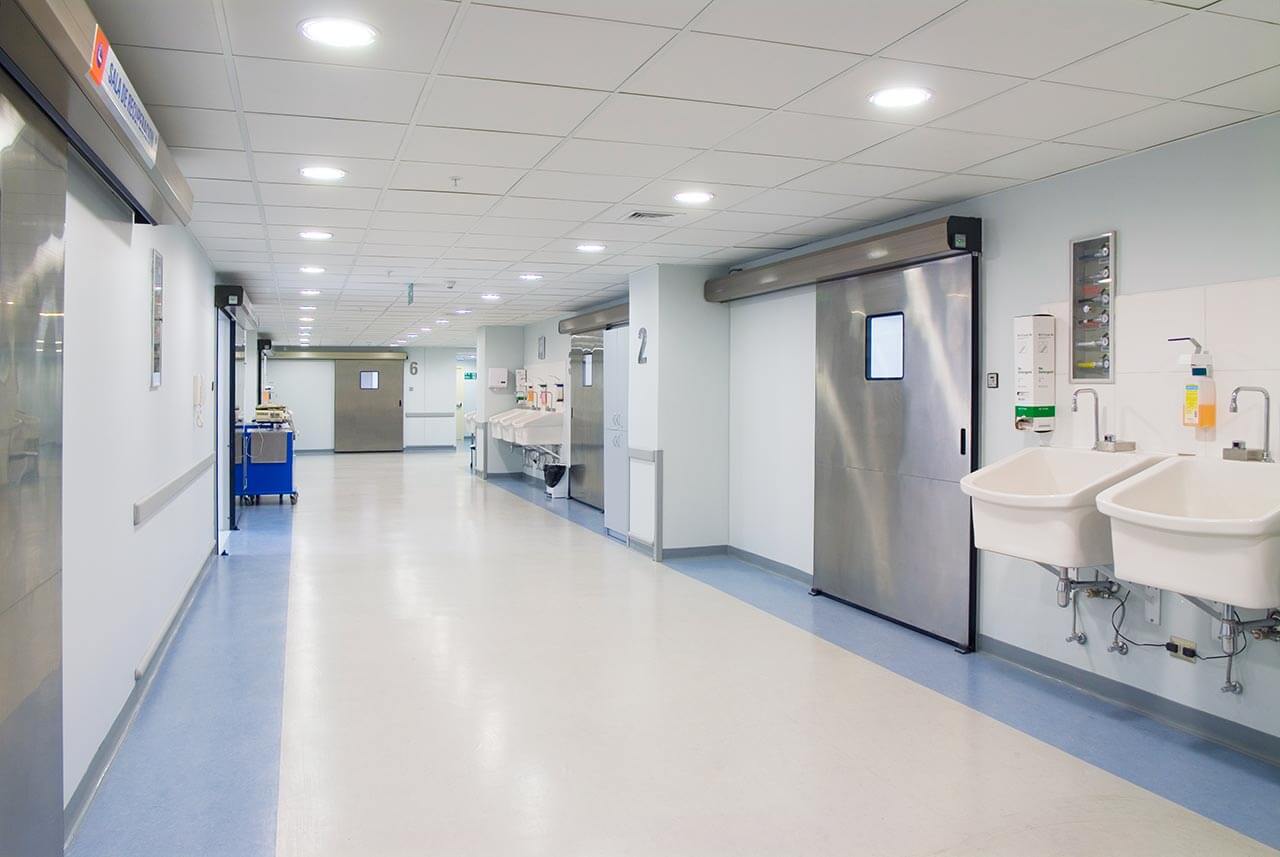
The program includes:
- Initial presentation in the clinic
- clinical history taking
- review of medical records
- physical examination
- laboratory tests:
- complete blood count
- biochemical analysis of blood
- indicators of inflammation
- indicators blood coagulation
- ophthalmologic examination:
- slit-lamp examination
- pupil function tests
- ocular motility test
- ophthalmoscopy
- perimetry (visual field test)
- computer perimetry
- visometry (without correction and with correction)
- keratometry
- pachymetry
- refractometry (objective, subjective, cycloplegic)
- autorefractometry
- non-contact tonometer
- biomicroscopy
- preparation according to preoperative standard
- corneal transplantation
- symptomatic treatment
- control examinations
- the cost of essential medicines and materials
- nursing services
- explanation of future recommendations
Required documents
- Medical records
Service
You may also book:
 BookingHealth Price from:
BookingHealth Price from:
About the department
The Department of Adult and Pediatric Ophthalmology at the University Hospital Saarland Homburg provides the full range of modern diagnostics and treatment for eye diseases. Of particular interest is the treatment of cataracts, glaucoma, age-related macular degeneration, retinal detachment, retinopathy, and refractive errors, including myopia, hyperopia, astigmatism, presbyopia, and strabismus. The department admits young patients under the age of 16. Children can undergo eye exams, including vision screening for premature babies and treatment of various pathologies. As a maximum care medical facility, the department has a modern infrastructure for providing highly effective medical care, namely operating rooms with state-of-the-art equipment, laser therapy rooms, a specialized outpatient clinic for neuro-ophthalmic diseases and visual impairment in children, and an Intravitreal Injection Therapy Center. A feature of the department is the presence of the in-house LIONS Cornea Bank, which is responsible for corneal removal, cultivation, and transplant. The Cornea Bank was opened in 2020 and is currently one of the leading medical facilities of this kind in Europe. In 2021, the specialists performed 676 corneal transplant procedures. The department's ophthalmologists thus have everything necessary to restore the vision of their patients. The department is headed by Prof. Dr. med. Berthold Seitz.
The department specializes in the surgical treatment of eye diseases. Surgical interventions are most often performed on an outpatient basis, which is an undoubted advantage for patients. The department's specialists have vast experience in the fields of refractive lens exchange for severe refractive errors, cataract surgery, anti-glaucoma surgery, surgical removal of tumors of the orbita, conjunctiva, and eyelids, and surgery to correct strabismus in adults and children. Prior to the surgical intervention, a patient undergoes comprehensive diagnostics, based on the results of which the attending physician determines the advisability of surgical treatment. During a preoperative consultation, the specialist tells the patient in detail about the upcoming surgical procedure, the technique of its performance, and anesthesia. Operations for eye pathologies are performed using microsurgical techniques under a surgical microscope. Upon the completion of surgical manipulations, the doctor puts a bandage on the eye, and the patient remains under medical supervision for some time.
Since 2016, a highly-specialized Intravitreal Injection Therapy Center has been operating in the department. Intravitreal injections involve the administration of drugs directly into the pathological focus, when treatment with eye drops or ointments does not give the desired result. This type of treatment is indicated for patients with retinal and macular pathologies. The method has been most widely used in the treatment of patients with macular edema, which is often caused by age-related macular degeneration, retinal vein occlusion, diabetes mellitus, or vascular neoplasms. Before the injection procedure, patients are given special antiseptic and anesthetic drops. Injections are performed under sterile conditions. After the procedure, the patient must return to the center for an eye exam within 2-5 days.
The KiOLoN Section admits young patients with eye diseases. Diagnostic procedures are available here to assess the visual acuity and structure of the baby's eyes, including screening of vision in premature babies to exclude retinopathy of prematurity. Pediatric ophthalmologists most often treat congenital cataracts and glaucoma, ptosis, and refractive errors (strabismus, amblyopia, myopia, hyperopia, and astigmatism). The main treatment for congenital cataracts and glaucoma is surgery. Surgery is also required to repair ptosis. Laser techniques (excimer lasers) are commonly used to treat refractive errors.
An integral part of the department's clinical practice is a corneal transplant. In many cases, a corneal transplant is the only method that can save a person's vision. During the operation, doctors take material from the LIONS Eye Bank, which was opened in July 2020. In 2021, the department's ophthalmologists performed 676 corneal transplant procedures. Patients from all over Germany, as well as France, Luxembourg, and other countries, regularly seek medical attention at the LIONS Eye Bank.
The department's key clinical focuses include the following:
- Inpatient medical care
- Full range of corneal surgical procedures at one of the most advanced LIONS Eye Bank in Europe, including corneal refractive surgery and keratoplasties
- Glaucoma surgery in children, as well as primary, secondary, and complicated forms of glaucoma in adults (including fistulizing and cyclodestructive interventions)
- Refractive cataract surgery and intraocular lens implantation in adults and children (including implantation of multifocal artificial lenses, also in combination with corneal surgery, antiglaucoma surgery, and lens interventions)
- Vitreous and retinal surgery
- Organ-preserving cancer surgery: lamellar resection and resection of malignant tumors of the anterior and posterior segments of the eye
- Eye muscle surgery in adults and children
- Plastic surgery on the eyelids and external parts of the eye, reconstructive surgery on the external and endonasal lacrimal ducts
- Combined orbital surgery (in cooperation with the Departments of Otolaryngology, Oral and Maxillofacial Surgery, and Neurosurgery)
- Outpatient medical care
- Individual selection of contact lenses, including special lenses
- Treatment of eye diseases using argon lasers, Nd-YAG lasers, and diode laser cyclophotocoagulation
- Intravitreal drug injections (Macugen, Lucentis, Avastin) for macular edema
- Photodynamic therapy for age-related macular degeneration and concomitant pathological processes
- Outpatient surgical treatment: laser interventions, phacoemulsification, and uncomplicated interventions on the vitreous body and retina
- Other therapeutic services
Curriculum vitae
Higher Education and Professional Career
- 11.1981 - 05.1988 Medical studies at the Friedrich Alexander University in Erlangen.
- 05.1988 Admission to medical practice (approbation).
- Since 07.1989 Fellow and Assistant Physician in the Department of Ophthalmology at the University Hospital Erlangen-Nuernberg.
- 09.1993 Board certification in Ophthalmology (Munich).
- 05/1996 European Examination Board, Exam in Ophthalmology, Paris (FEBO).
- Since 09.2002 C3 Professor and Associate Professor in Ophthalmology.
- Since 03.2006 Head of the Department of Adult and Pediatric Ophthalmology at the University Hospital Saarland Homburg.
Awards, Prizes and Distinctions
- 1999 Santen Poster Prize for poster presentation in corneal and refractive surgery.
- 2000 Achievement Award from the American Academy of Ophthalmology for contributions to the Academy, its scientific and educational programs, and ophthalmology.
- 2005 Sicca Research Award for Dry Eye Syndrome from the Professional Association of Ophthalmologists in Germany (BVA).
- 2010 Gold Medal for Outstanding Medical Care.
- 2010 Silver Medal from the German Ophthalmological Society (DOG).
- 2011 Best Report at the Meeting of the 2nd Congress of the European Society of Cornea and Ocular Surface Disease Specialists.
- 2013 Ryan Belfort Medal from the American Brazilian Ophthalmological Association (ABOA).
- 2015 Amber Cornea in Gold Award.
- 2015 Research Prize from the German Ophthalmological Society (DOG).
- 2015 Silver Medal from the German Ophthalmological Society (DOG).
- 2016 Ernst von Bergmann Plakette Award.
- 05.2018 Visiting Professor at Anhui Provincial Hospital in China.
- 06.2018 Honorary Member of the Hungarian Ophthalmological Society.
- 06.2018 Honorary Member of the Polish Ophthalmological Society.
- 04.2019 Honorary Member of the Union of Bolgarian Ophthalmologists.
Membership in the Professional Societies and Associations
- Since 1989 German Ophthalmological Society (DOG).
- Since 1991 Association for Research in Vision and Ophthalmology (ARVO).
- Since 1992 Professional Association of Ophthalmologists in Germany (BVA).
- C 1997 American Academy of Ophthalmology (AAO).
- C 1998 German Transplantation Society (DTG).
- C 1998 European Association for Vision and Eye Research (EVER).
- C 2000 Association of German Eye Banks.
- C 2002 Founding Member and Representative of the Section for Corneal Diseases in the German Ophthalmological Society.
- C 2003 International Society of C 2003 Dacryology and Dry Eye (ISD&DE).
- C 2003 European Eye Bank Association (EEBA).
- C 2004 Cornea Society.
- C 2008 European Society of Cataract and Refractive Surgeons (ESCRS).
- Member of the National Academy of Naturalists "Leopoldina".
- C 2016 German Committee for the Prevention of Blindness (DKVB).
Photo of the doctor: (c) Universitätsklinikum des Saarlandes
About hospital
The University Hospital Saarland Homburg is the largest hospital in the city of Homburg and the most important medical facility in the region. The hospital, which currently has 30 specialized departments and 20 institutes, was founded in 1947 and operates on the basis of Saarland University. The hospital plays a leading role in medical education, research, and medical care both in the state of Saarland and throughout Germany. With vast experience in serving foreign patients, the medical facility is also widely known in the international medical arena.
The pride of the hospital is state-of-the-art equipment that allows the doctors to perform high-precision comprehensive diagnostics and the most sparing treatment even if a patient has a severe pathology. Patients are offered innovative medicine based on the very latest scientific achievements. At the same time, the hospital offers many therapeutic methods that are used only in leading medical centers in Europe, including da Vinci robot-assisted surgery, CAR T-cell therapy, TAVI and MitraClip catheter-based procedures, innovative laser procedures, etc. Great importance is paid to ethical and social competence. The hospital is constantly improving the work of its medical personnel and infrastructure to provide medical services that meet the highest standards.
As a multidisciplinary medical complex, the hospital offers highly effective treatment of the full range of common diseases as well as rare and severe pathologies. The efforts of the medical staff, which includes over 600 doctors and 2,000 nurses, are focused on the patient and their unique needs and desires. The doctors always devote enough time to personal communication with their patients, provide them with moral support, and are sympathetic to every life situation.
Photo: (с) depositphotos
Accommodation in hospital
Patients rooms
The patients of the University Hospital Saarland Homburg live in comfortable single, double, and triple patient rooms with a modern design. Each room is equipped with an ensuite bathroom with a shower and a toilet, as well as everything else necessary: a comfortable bed, a bedside table, a TV, and a telephone. In addition, enhanced-comfort rooms and specially equipped rooms for people with disabilities are available for the patients.
Meals and Menus
The hospital offers healthy and delicious meals three times a day: buffet breakfast, dinner with a wide choice of dishes for every taste, and a light supper. The menu features dietary and vegetarian dishes. There is also a cafeteria on the territory where one can taste delicious dishes and have a cup of coffee, tea, or some refreshing drinks
Further details
The standard patient rooms include:
Religion
The hospital regularly hosts catholic and evangelical devine services. The services of representatives of other religions are available upon request.
Accompanying person
During an inpatient program, an accompanying person can stay with you in the patient room or in a hotel of your choice.
Hotel
During an outpatient program, you can stay in a hotel of your choice. The managers will help you choose the most suitable options.





